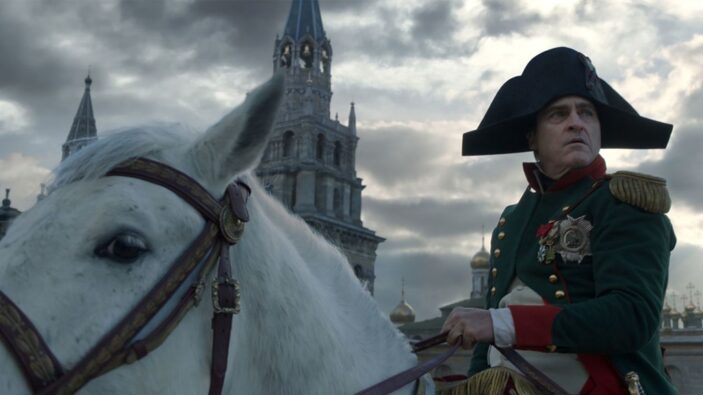
Despite the grandeur of some of its large scale battle sequences and reliable talent across the board, there’s a disjointedness to Ridley Scott‘s Napoleon that renders it shockingly inept at times and, overall, rather underwhelming.
Hailed as one of the greatest military leaders and strategists in history, the Napoleon depicted here (as portrayed by Joaquin Phoenix) never quite rings true to his supposed reputation, and though the decision to place focus on his tumultuous romance with Empress Joséphine makes way for an interesting dynamic – and surprisingly humorous dialogue – it ultimately only contributes to a film that has trouble finding cohesive footing; and that’s with a running time of 157 minutes.
Scott has stated that there’s a 250 minute cut of the film in existence, one that he hopes will see a release in theatres and on Apple TV+ (where this current cut of the film will be released at a later date), and that it explores more of Joséphine’s story, which would perhaps explain why she, as a character, feels underdeveloped (despite a fine enough turn from Vanessa Kirby) and the film as a whole has an air of incompletion, with many sequences feeling as if they have been removed to the detriment of what remains.
What does remain centres around Napoleon Bonaparte’s rise to power in the aftermath of the French Revolution. The film’s rather striking prologue suggests that audiences may be in for a treat as we witness the beheading of Queen Marie Antoinette (Catherine Walker). It’s a violent image that stays with us, but once it ends it doesn’t take long for David Scarpa‘s script to time jump as it mentions key victories throughout Napoleon’s subsequent rise without ever truly unpacking them. These victories assist in his eventual turn as Emperor, but Scott never lets us sit with any moment long enough for them to hold the weight they so evidently carried.
The inclusion of Joséphine makes way for a bizarrely entertaining dynamic between herself and Napoleon – only enhanced by Phoenix’s bratty-at-times performance – and their co-dependent relationship is fascinating to watch, but Joséphine never comes across as this grand figure in Napoleon’s life; at least not how its portrayed here. They treat each other horribly, yet they continually pine for one another. She can’t produce an heir, which infuriates him (and makes way for some truly hilarious jack-rabbit-like sex scenes) but his mistreatment of her never seems to entirely push her away, even as she engages in extra-marital affairs, which, in turn, rightfully angers Napoleon but never to the point of leaving her. As I said, it’s fascinating, but Joséphine feels so underdeveloped, aside from being little more than a harlot, that the film’s focus on them ultimately feels redundant.
Outside of their relationship – which is often all Phoenix’s voice-overs can mention during battle segments – the sequences highlighting Napoleon’s supposedly inspirational charm fail to do so. There’s no question that he’s a competent leader in battle, but there’s a lack to how he earned such loyalty from those around him. Similarly, Scott fails to inject much humanism into the battle scenes beyond Napoleon himself. These sequences are often quite realistically brutal, and they are shot with confidence by cinematographer Dariusz Wolski (who has frequently collaborated with Scott over the years on such projects as Prometheus, The Counselor, The Martian, The Last Duel, and House of Gucci), but they ultimately lose their impact as every other character proves interchangeable.
Perhaps Scott’s definitive cut will amend many of this version of Napoleon‘s flaws, and, if so, there is possibly a truly great story to be told, but, as this stands, the ambition fails to match the execution. There’s a lack of substance and a true feeling of incompletion, not at all helped by Phoenix’s tonally confused performance that can’t decide on whether or not it wants to honour the madness or the genius of the character.
![]()
![]()
![]()
![]()
![]()
TWO STARS (OUT OF FIVE)
Napoleon is now screening exclusively in Australian theatres.
